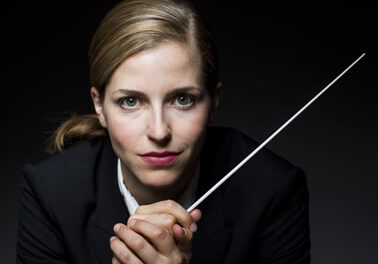Violetta, Verdi’s heroine in his tragic opera La traviata is not the only person who has fallen on hard times. The Greensboro Opera Company lost United Arts Council funding this year and operates “without significant financial support from” corporations, government, or arts foundations. Thus the GOC had to devise a scaled-back version for a single performance of this venerable staple in the repertory — Verdi’s story of a famous courtesan who dies of tuberculosis in the arms of her recently reunited lover, Alfredo.
Gone were the sets and the elaborate costumes, and the staging was minimal with the curtain never fully open. In place of supertitles was a PowerPoint presentation that provided not only the English translation, but snapshots of Paris and evocative portraits of what one could assume were to represent images from the opera: Violetta, matadors, and camellias. The images were only partially successful, and the small font size of the blurry translation was improved after the first act.
But the singers were there in full force. The centerpiece of the opera is Violetta Valéry who is found in every scene and has some of the most taxingly gorgeous music. This production’s Violetta was Jennifer Black, who was exquisite. Her singing was a delight throughout the evening. From the florid, coloratura passages in “Sempre libera” (“Always free”) in the first act to “Addio del passato” (”Farewell to the past”) during the final moments of her life in the third act, she was a powerful and believable protagonist.
Her voice never failed to fill the large War Memorial Auditorium, even when she sang pianissimo. She possesses that marvelous ability to pare a large, full sound down to a ghost of a whisper. Stunning.
Her lover, Alfredo, was sung unevenly by Chad Johnson. There were moments in which his singing caught the “springtime ardor of his youth,” such as in the final act duet “Parigi, o cara” (“Paris, o beloved”). And although Johnson certainly looked and acted like the dashing hero, his singing was often short of the mark.
Alfredo’s father, Giorgio, was strongly sung by Mark Walters. I suspect most audience members, with more contemporary morals, find it hard to feel empathy with Giorgio’s pleading to Violetta to give up her love for the sake of the family’s good name. Yet Walters’ heart-felt and robust singing almost had me convinced.
Several smaller roles are integral to the opera, and each singer successfully filled the part. Janine Hawley and Elizabeth Grayson were Violetta’s friend and maid respectively. Lindell Carter and Scott MacLeod were Alfredo’s friend and rival. Jeffrey Carlson sang both the role of Dottore Grenvil and Marquese d’Obigny. Other named singers included James Williams. and Lucas L. Cecil.
The lively chorus added a great deal of color and energy to the proceedings. They were well-prepared, thanks to Chorus Master Welborn Young. The Greensboro Symphony Orchestra was led by GOC Artistic Director/Conductor, Valéry Ryvkin. Vernon Hartman was responsible for stage direction.
There was an unusually large audience for the performance, perhaps because there was only one, instead of the usual two. From the hacking and coughing from the gathered crowd, one could have thought that many had sympathetically caught tuberculosis from Violetta.











